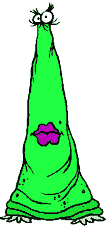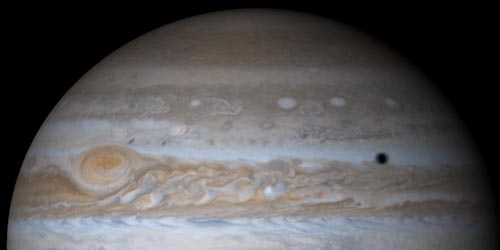Jupiter
Mercury - Venus - Earth - Mars - Jupiter - Saturn - Uranus - Neptune - Pluto
Two astronauts went to a
bar on the moon, but they left after a few minutes ?
You see, it had no atmosphere !
Moon(s): Metis, Adrastea, Amalthea and Thebe , Io , Europa , Ganymede , Callisto , Leda, Himalia, Lysithea, Elara, Ananke, Carme, Pasiphae and Sinope
Equatorial diameter: 142,984 km (11.209 Earths)
Mass: 1.899�1027 kg (317.8 Earths)
Equatorial gravity: 23.12 m/s2 (2.358 gee)
Named after: the Roman god Jupiter (also called Jove)
Orbital period: 4333 Earth days
Star sign:

Jupiter is the fifth planet from the Sun and far by the largest in our solar system. Jupiter has immense gravity.
Jupiter is the forth brightest object in sky (after the Sun, the Moon, and Venus). The gas planet does not have a solid surface, but rather gaseous material which gets denser with depth. Jupiter is 90% hydrogen and 10% helium. It contains small traces of methane, water, ammonia, and rock.
Jupiter probably contains a core of rocky material 10-15 Earth masses.
Above the core is liquid metallic hydrogen, consisting of ionized protons and electrons. At the temperature and pressure of Jupiter's interior, hydrogen is a liquid, not a gas. It is an electrical conductor and source of Jupiter's magnetic field.
The outermost layer is primarily ordinary hydrogen and helium - liquid in the interior and gaseous further out.
The atmosphere contains water, carbon dioxide, methane, and other small molecules in tiny amounts.
Jupiter has a huge magnetic field, much stronger than Earth's.
Jupiter has rings like Saturn but much fainter. Unlike Saturn, Jupiter's rings are dark, probably composed of very small grains of rocky material. They also don't seem to contain ice.
|
|
|
A picture of Jupiter |
How do spacemen pass the time on long trips
?
They play astronauts and crosses !
Back to Main Page.
